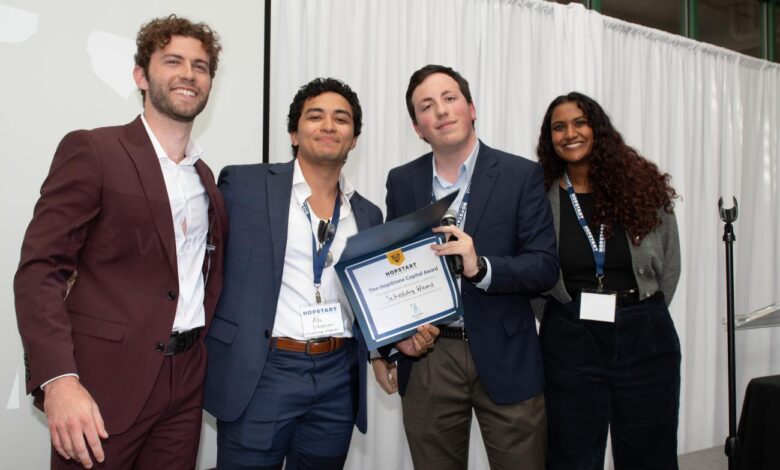HopStart challenge showcases Johns Hopkins student start-ups

Student teams from across the university competed for $45,000 in prizes at the 24th annual HopStart: Hopkins New Venture Challenge held Friday, April 26, at the Inn at the Colonnade, north of the Johns Hopkins’ Homewood campus. Competitors began preparing for the event in mid-February by writing full business plans and receiving feedback from industry professionals.
Fifty-five teams pitched their startup ideas, including a Baltimore-based harm-reduction program created by a team of Clark Scholars, a versatile, software-based thermal solution for satellite production, and a port system for fetal therapy procedures over the event’s two rounds of competition. More than 20 judges, many of them Johns Hopkins alumni, evaluated those pitches and selected first-, second-, and third-place winners in each of the competition’s four categories. The Pava Center for Entrepreneurship, A-Level Capital, and HopStone Capital sponsored additional prizes.
Kelly Schulz, the CEO of the Maryland Tech Council, delivered the keynote address at the HopStart awards ceremony. Schulz highlighted Maryland’s dynamic tech industry and encouraged competitors to continue working on their startups and enter the state’s startup ecosystem.
“This year’s HopStart competition was a resounding success in every possible way,” said Len Foxwell, director of HopStart and lecturer at the Whiting School of Engineering’s Center for Leadership Education, the event host. “We attracted more contestants, mentors, and judges than last year; the presentations were as good as I’ve ever seen, and the day’s positive energy had to be experienced to be believed. As successful as HopStart 2024 was, we are already planning for next year’s competition, which we hope will be even bigger and more impactful for our students. HopStart truly represents the nexus of education, innovation and entrepreneurship.”
Teams from the Krieger School of Arts and Sciences, the Peabody Institute, and the Whiting School of Engineering walked away with prizes, including in the competition’s four main categories: General Ventures I and II and Medical Technology and Life Sciences I and II. First-place teams received $5,000, second-place teams won $3,000, and third-place teams won $1,000.
HopStart Winners
General Ventures I: Team KaraOrchee, an online platform dedicated to bringing together musicians, music enthusiasts, and a diverse community of non-musicians, ensuring that everyone can experience the magic of music. Team members: Xiaoyu Jackson Guan, Zheyu Crystal Jiang, Rishitha Kalicheti, Qinyuan Justin Liu.
General Ventures II: Team SQUID3 Space, a software-definable thermal solution for rapid and responsive satellite development. Team members: Dustin Holta, Brian Phan, Warren Su.
Medical Technology and Life Science Ventures I: Team OcuSound, an at-home intraocular pressure sensor to detect glaucoma progression. Team members: Maria Giannakopoulos, Alex Kroumov, Hyun Seo Lee, Elliott Leow, Ben Miller, Ashish Nalla, Valerie Wong, Nancy Yan.
Medical Technology and Life Science Ventures II: Team SinuStim, a wearable, portable neuromodulation device for the treatment of chronic rhinosinusitis. Team members: Abhiram Cherukupalli, Sandhya Tiku, Roanne Yehia.
The Pava Center for Entrepreneurship Award
The ARE Board, an inexpensive alternative to digital whiteboards, features an integrated conveyor belt that seamlessly saves notes and an adjustable eraser bracket that automatically cleans the writing surface upon command. Team Members: Jim Le, Jason Ahn, Isaac Mikanatha, Andrew Zhang.
Glyph AI, a platform that seeks to overcome healthcare communication inequities using automatically generated images for translating hospital discharge information. Team Members: Payton Barnes, Austin Dai, Linika Goel, Sophia Hibner, Sangeeta Koilada, William Sun, Ria Thakur, Samhita Vasu.
SilkSnare, a bio-inspired alternative to plastic fishing nets developed from silk materials. Team Members: Justin Blumenthal, Alex Dong, Siyona Mishra, Nicholas Perez, Lucy Wu, Sophia Xu.
SinuStim (described above)
Each team received $500.
The HopStone Capital Award
ReNuNerve, a wearable device to correct gait for diabetic neuropathy patients by providing sensory feedback. Team Members: Rida Amjed, Sainkhuu Enkh-Otgon, Shirley Lin, Fujia Zheng
Scheduling Wizard, a platform that provides optimized schedules for high school and middle schools that meet state, district, and individual school requirements. Team Members: Ab Hamimi and Sam Oberly.
Each team received $3,000.
The A-Level Capital Award
Vive, a self-applied, disposable, non-electronic wearable that can automatically detect lethal opioid overdose and deliver the antidote, naloxone. Team Members: Asher Varon.
Vive received $1,000.



